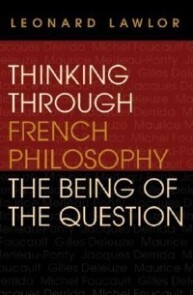". . . no other book undertakes to relate all these French philosophers to each other the way that [Lawlor] does, brilliantly." -François Raffoul
For many, Jacques Derrida, Michel Foucault, and Gilles Deleuze represent one of the greatest movements in French philosophy. But these philosophers and their works did not materialize without a philosophical heritage. In Thinking through French Philosophy, Leonard Lawlor shows how the work of Maurice Merleau-Ponty formed an important current in sustaining the development of structuralism and post-structuralism. Seeking the "point of diffraction," or the specific ideas and concepts that link Derrida, Foucault, and Deleuze, Lawlor discovers differences and convergences in these thinkers who worked the same terrain. Major themes include metaphysics, archaeology, language and documentation, expression and interrogation, and the very experience of thinking. Lawlor's focus on the experience of the question brings out critical differences in immanence and transcendence. This illuminating and provocative book brings new vitality to debates on contemporary French philosophy.

